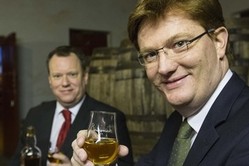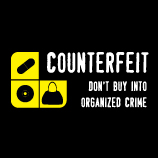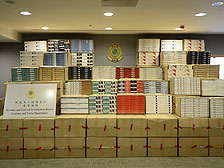Poll on mind, Cabinet set to ratify sops
The Cabinet meeting scheduled for Monday seems to have a definite agenda. With the Lok Sabha elections round the corner, the Council of Ministers is expected to announce a series of tax concessions. The Cabinet will discuss the withdrawal of one-time tax on city buses operating in Amritsar, Jalandhar, Ludhiana and Bathinda; withdrawal of sin tax on cigarettes and slashing VAT on iron and steel goods, scrap and finished goods. All these decisions are aimed at wooing the urban voters. The SAD-BJP Government feels that these people have weaned away from them because of imposition of property tax and advance tax. Sources said there was a proposal to waive one-time tax on buses operating in cities, amounting to Rs 500 per bus. This tax is paid to the Transport Department before the buses are commissioned. These buses have been commissioned under the Centre’s Jawaharlal Nehru National Urban Renewal Mission and the government proposes to waive this tax so as to make travel cheaper.
Lear More
MMEA foiled smuggling of cigarettes worth RM1m last year
PORT KLANG: The Malaysian Maritime Enforcement Agency (MMEA) foiled the smuggling of 3,264,800 cigarettes last year. The haul, worth about RM1 million, was seized through numerous enforcement operations within Selangor and Johor waters. MMEA southern region enforcement chief First Admiral Adon Shalan said the tobacco products were discovered without proper tax stamps. “The increasing demand for cheap cigarettes at roughly RM6 per box has become a factor in the increase of such illicit trade activities,” he said during a press conference after the disposal of the smuggled cigarettes at the MMEA office, here. He added that many of the smugglers were also equipped with four-cylinder boats while MMEA was only utilising two-cylinder boats. Nevertheless, he said the agency would increase its efforts and cooperation with other agencies to trace such illegal activities. He revealed that the agency would increase the number of officers involved in enforcement patrols from 700 to 1,100 this year.
Lear More
Man ordered to pay for smuggling tobacco
A Nottingham man has been sentenced for evading close to £21,000 in excise duty, after smuggling 100kg of hand-rolling tobacco into Portsmouth Ferry Port. He was ordered to repay the duty within six months – or face 15 months in prison and still owe the money. Paul Adlington concealed the tobacco within internal panelling of his Ford Transit van. He was arrested by Border Force officers at the city’s continental ferry port in August, and pleaded guilty at Portsmouth Crown Court on Friday 10 January. “It is important that we pursue criminals’ profits through the courts and recover money for UK taxpayers. This type of crime not only undermines legitimate retailers who have to compete with illegal imports, but also costs the UK economy around £2billion a year. People with information about tobacco smuggling should contact the Customs’ Hotline on 0800 59 5000.”
http://www.itv.com/news/meridian/story/2014-01-14/man-fined-thousands-for-smuggling-tobacco/
Lear More
UK spirits verification scheme comes into force
A new scheme to protect regional alcoholic specialties from counterfeit and substandard competition has been launched in the UK. The Spirit Drinks Verification Scheme (SDVS) is designed to help consumers in the UK and abroad identify genuine Scotch whisky and other spirits of UK origin and avoid buying illicit products that could damage their health. The system – which has been in gestation for some time – was officially launched on January 10 by Chief Secretary to the Treasury, Danny Alexander.
Lear More$100,000 in counterfeit clothing seized in raid on Fruit Belt market
Police raided a Fruit Belt food store Monday, thinking they would find illegal guns. They found some weapons, but police said they also found something else – more than $100,000 in counterfeit trademark clothing. Hats, sneakers, jackets, belts and other apparel were seized along with $25,000 in cash believed to be profits from sales of the bootleg clothing. The clothing had fake labels from Air Jordan, Champion, Coach, the National Football League, National Basketball Association and Major League Baseball. There were more than 1,000 New York Yankees baseball hats alone amid the boxes of clothing filling the warehouse, police said.
Lear More

‘Counterfeit: Don’t buy into organized crime’ – UNODC launches new outreach campaign on $250 billion a year counterfeit business
A new global campaign has been launched by UNODC to raise awareness among consumers of the $250 billion a year illicit trafficking of counterfeit goods. The campaign – ‘Counterfeit: Don’t buy into organized crime’ – informs consumers that buying counterfeit goods could be funding organized criminal groups, puts consumer health and safety at risk and contributes to other ethical and environmental concerns. The campaign is centred around a new Public Service Announcement which was launched on the NASDAQ screen in New York’s Times Square and is being aired on several international television stations starting this month. The campaign urges consumers to ‘look behind’ counterfeit goods to boost understanding of the serious repercussions of this illicit trade.
Lear MoreMan Must Pay £21,000 After Smuggling 100kg Of Tobacco
A man has been ordered to pay back £21,000 after smuggling 100 kilos of tobacco into Portsmouth Ferry Port. 49 year old Paul Addlington, of Silverwood Road, Bottesford, Nottingham, concealed it in the internal panels of his Ford Transit van. He was ordered to repay the evaded excise duty within six months, or face 15 months in prison and still owe the money. Adlington, who is unemployed, was arrested by Border Force officers at the city’s continental ferry port on 8 August 2013, as he returned to the UK via Caen, France. HM Revenue and Customs (HMRC) took over the investigation.
Lear More
Is Your Brand Prepared to Battle the Online Counterfeiters?
As we enter 2014, retailers can hang their hats on these two pegs: consumers will continue to flock to shop in digital channels and consumers love a good deal. However, the increasing abundance of savvy online counterfeiters targeting deal seekers is creating major challenges for brands. It’s important to understand the dynamics of deals and fakes across the ecommerce ecosystem in order to prevent brand hackers from stealing your revenue and customers. Apparel and fashion brands are a prime target for counterfeiters and the digital world gives them more ways to appear legitimate that are beyond the reach of street-corner sellers. E-commerce sites hawking fake products appear professional, often featuring photography drawn from brands’ most recent advertising campaigns, and present consumers with seemingly viable choices. Counterfeiters are smart about pricing, too, tricking consumers by pricing counterfeit goods to appear as legitimate goods on sale. Counterfeit goods are often offered at 25 percent to 50 percent discounts, comparable to end-of-season or ‘blowout’ sale rates. Because these prices are plausible, bargain hunters are that much more likely to snatch up counterfeit goods thinking they’ve just found an incredible deal.
Lear More
4 arrested for cigarette smuggling
Customs officers have arrested four people and seized nearly four million illicit cigarettes worth $9.4 million, and with a duty potential of about $6.6 million. In a week-long operation, they intercepted a van in Sha Tin and found 400,000 illicit cigarettes. They then raided a storage centre in Sham Shui Po and found another 800,000 illicit cigarettes. Then they intercepted an incoming cross-boundary vehicle and found 2.7 million illicit cigarettes mixed with other goods. Three men and one woman, aged 26 to 56, were arrested.
http://www.news.gov.hk/en/categories/law_order/html/2014/01/20140111_170703.shtml
Lear MoreKan. woman’s sentencing for selling counterfeit luxury goods at Wichita store set for March 10
WICHITA, Kansas — A Wichita woman will be sentenced March 10 in federal court for selling fake luxury goods at her shop. Glenda Sue Morgan, owner of The Fabulous Store, pleaded guilty in October to one count of trafficking in goods bearing counterfeit designer labels such as Prada and Chanel. Her sentencing has been postponed until March 10. Morgan faces maximum penalties of a $2 million fine and 10 years imprisonment. But prosecutors agreed to recommend a sentence at the low end of the federal guidelines. Investigators seized 400 replica items with a retail value of $14,000 from Morgan’s shop. Those goods would have been worth $140,000 had they been genuine.
Lear More



